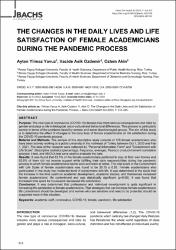| dc.contributor.author | Yavuz, Ayten Yılmaz | |
| dc.contributor.author | Özdemir, Vacide Aşık | |
| dc.contributor.author | Akın, Özlem | |
| dc.date.accessioned | 2023-08-15T08:29:28Z | |
| dc.date.available | 2023-08-15T08:29:28Z | |
| dc.date.issued | 2023 | en_US |
| dc.identifier.citation | Yavuz, A.Y., Özdemir, V.A. & Akın, Ö. (2023). The changes in the daily lives and life satisfaction of female academicians during the pandemic process. Journal of Basic and Clinical Health Sciences, 7(1), 314-325. https://doi.org/10.30621/jbachs.1107568 | en_US |
| dc.identifier.issn | 2458-8938 | |
| dc.identifier.issn | 2564-7288 | |
| dc.identifier.uri | https://doi.org/10.30621/jbachs.1107568 | |
| dc.identifier.uri | https://hdl.handle.net/11436/8002 | |
| dc.description.abstract | Purpose: The new type of coronavirus (COVID-19) disease has more serious consequences and risks by gender and plays a role in biological, socio-cultural and behavioral differences. This process is particularly severe in terms of the problems faced by women and some disadvantaged groups. The aim of this study is to determine the effect of changes in the daily lives of female academicians on life satisfaction during the COVID-19 pandemic process. Material and Methods: The sample of this descriptive study consists of 178 female academicians who have been actively working at a public university in the northeast of Turkey between Oct 1, 2020 and Feb 1, 2021. The data of the research were collected by "Personal Information Form" and "Contentment with Life Scale". Descriptive statistics (percentage, frequency, average), Pearson product-moment correlation analysis, t-test, and ANOVA test were used to evaluate the data. Results: It was found that 83.1% of the female academicians preferred to stay at their own homes and 52.8% of them did not receive support while fulfilling their daily responsibilities during the pandemic process in which female academicians had to work and learn at home. The total score of the Contentment with Life Scale of female academicians was found to be 20.15 +/- 6.95. Female academicians who participated in the study had moderate level of contentment with life. It was determined in the study that the increase in the time spent on academic development, academic studies, and themselves increased female academicians' life contentment and was statistically significant (p<0.05). It was found that increased time spent for housework decreased life satisfaction. Conclusion: It was determined that professional and individual development is quite significant in increasing life satisfaction in female academicians. That strategies that can increase female academicians life contentment should be developed and women who are sensitive and need to be protected should be supported more in this situation. | en_US |
| dc.language.iso | eng | en_US |
| dc.publisher | Dokuz Eylul University | en_US |
| dc.rights | info:eu-repo/semantics/openAccess | en_US |
| dc.subject | Academic staff | en_US |
| dc.subject | Coronavirus | en_US |
| dc.subject | COVID-19 | en_US |
| dc.subject | Female | en_US |
| dc.subject | Pandemic | en_US |
| dc.subject | Life satisfaction | en_US |
| dc.title | The changes in the daily lives and life satisfaction of female academicians during the pandemic process | en_US |
| dc.type | article | en_US |
| dc.contributor.department | RTEÜ, Sağlık Yüksekokulu, Hemşirelik Bölümü | en_US |
| dc.contributor.institutionauthor | Yavuz, Ayten Yılmaz | |
| dc.contributor.institutionauthor | Özdemir, Vacide Aşık | |
| dc.contributor.institutionauthor | Akın, Özlem | |
| dc.identifier.doi | 10.30621/jbachs.1107568 | en_US |
| dc.identifier.volume | 7 | en_US |
| dc.identifier.issue | 1 | en_US |
| dc.identifier.startpage | 314 | en_US |
| dc.identifier.endpage | 325 | en_US |
| dc.relation.journal | Journal of Basic and Clinical Health Sciences | en_US |
| dc.relation.publicationcategory | Makale - Uluslararası Hakemli Dergi - Kurum Öğretim Elemanı | en_US |


















